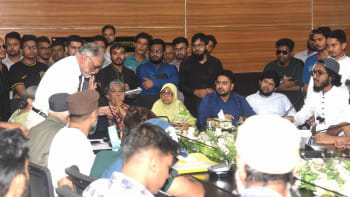Bollywood music director Khayyam passes away

Veteran Bollywood music director Khayyam, who will be remembered for his contribution to super hit films 'Umrao Jaan' and 'Kabhi Kabhie', died on Monday night in a Mumbai hospital after prolonged illnesses.
Mohammed Zahur Hashmi, 92, better known as Khayyam, was admitted to Sujay Hospital in Mumbai suburb Juhu a few days ago owing to breathing problem and other age-related illnesses, reports our New Delhi correspondent.
According to the composer's spokesperson, Khayyam's mortal remains will be kept at his residential complex from 10:00 am onwards for people to pay their last respect. Thereafter, his funeral will take place, the spokesperson said.
Prime Minister Narendra Modi paid glowing tributes to Khayyam. "India will remain grateful to Khayyam Sahab for giving us some of the most memorable compositions, which will be remembered forever," Modi tweeted.
"He will also be remembered for his humanitarian gestures to support upcoming artists. His demise is extremely saddening," the Indian PM added.
Legendary singer Lata Mangeshkar also took to Twitter and wrote that Khayyam's demise is the end of an era in music.
"Great musician and a man with a kind heart, Khayyam sahab isn't with us anymore. I am so saddened to hear this, I can't put it in words. With Khayyam sahab, an era of music has ended. I offer my humble tribute to him," she wrote.
In a subsequent tweet, she said though she loved working with Khayyam, she was also scared because he was a perfectionist.
"Khayyam sahab would treat me as his younger sister. For me, he used to make his special songs. I loved working with him but would also be a little scared because he was a perfectionist. His understanding and knowledge of Shayari was exceptional," Lata Mangeshkar tweeted.
Amitabh Bachchan remembered Khayyam as "a soft-spoken, amiable soul", who contributed to his several films, including 'Kabhi Kabhie' and 'Trishul'.
"Umrao Jaan" director Muzaffar Ali remembered Khayyam as a "storehouse of feelings, emotions and music".
Reminiscing the memories of the 1982 film featuring Farooq Sheikh and Rekha, Ali said it took Khayyam and him almost two years to create the music for the movie.
"Day in, day out, I used to go to him. He used to stay at my house. It was an evolution of music. Today, no composer, director or producer will spend so much time on making the music. We left no stone unturned for this film's music," said Ali.
Khayyam's other notable works include films such as "Trishul", "Noorie" and "Shola Aur Shabnam".
In 2007, Khayyam was honoured with Sangeet Natak Akademi Award in Creative Music by Indian government's Sangeet Natak Akademi. Four years later, he was conferred the Padma Bhushan, India's third highest civilian award.
Yearning is the essence of Khayyam's music and this is most succinctly brought out in his compositions 'Umrao Jaan' (1981). Listen to songs 'Dil cheez kya hai aap meri jaan lijiye', 'In aankhon ki masti ke', 'Ye kya jagah hai doston' or 'Zindagi jab bhi teri bazm mein lati hai hume' and one is bound to be captivated. The feat fetched him the national award for best music direction.
Similar is the case with numbers in Amitabh Bachchan, Rakhee and Shashi Kapoor-starrer 'Kabhi Kabhi" (1976). The evocative music of songs 'Kabhi kabhie mere Dil mein' will always keep music lovers spell-bound.
Born in 1927 in in Rahon in undivided Punjab state, Khayyam, it is said, as a child ran away to his uncle's house in Delhi to learn music. Though his uncle admitted him to a school, he was impressed by Khayyam's passion for music and helped him nurture it.
At the age of 17, Khayyam started his musical journey in Lahore, assisting noted Pakistani music composer Baba Chisti with whom he worked for six months before joining the British Army during the World War II.
On his return, Khyyam shifted to Mumbai where he made his debut as 'Sharmaji' of the music composer duo -- Sharmaji-Varmaji with Rahman Varma. The duo scored their first composing gig for 1948 film 'Heer Ranjha'. The partnership broke up after Varma decided to move to the newly-created Pakistan after the Partition.
Khayyam then decided to work alone and composed music for films 'Biwi' (1950), 'Footpath' (1953) and 'Phir Subah Hogi' (1958).
The song Akele mein wo ghabrate to honge , sung by Mohammad Rafi, brought Khayyam to fame. But it was Raj Kapoor and Mala Sinha-starrer 'Phir Subah Hogi' that brought Khayyam widespread acclaim. For the music in the film, he worked with noted poet Sahir Ludhianvi and singers Mukesh and Asha Bhosle. "Woh subah, kabhi to aayegi" is one of the most popular songs from the film.
Khayyam's music in the 1961 blockbuster "Shola Aur Shabnam" cemented his place in Bollywood and songs by Rafi, Lata Mangeshkar and the music director's wife Jagjit Kaur. Noted poet-lyricist Kaifi Azmi had penned the lyrics.
Khayyam followed it up with musical superhits -- "Mohabbat Isko Kehte Hain" (1965) and "Aakhri Khat" (1966), which marked the debut of Rajesh Khanna.
Then came "Kabhi Kabhi" and songs like 'Main pal do pal ka shayar hoon' and 'Tere chehre se' catapulted Khayyam to the peak of popularity.
In "Trishul" (1978, Khayyam's music was once again captivating with songs such as 'Mohabbat bare kaam ki cheez hai.'
Khayyam also scored the music for films like Dil-e-Nadaan (1982), Bazaar (1982), Baawri (1982), Sawaal (1982), Dil... Akhir Dil Hai (1982) and Razia Sultan (1983). His curtain call as a composer came in 1990 only to return briefly for Rekha's 2006 drama 'Yatra.'


 For all latest news, follow The Daily Star's Google News channel.
For all latest news, follow The Daily Star's Google News channel. 



Comments